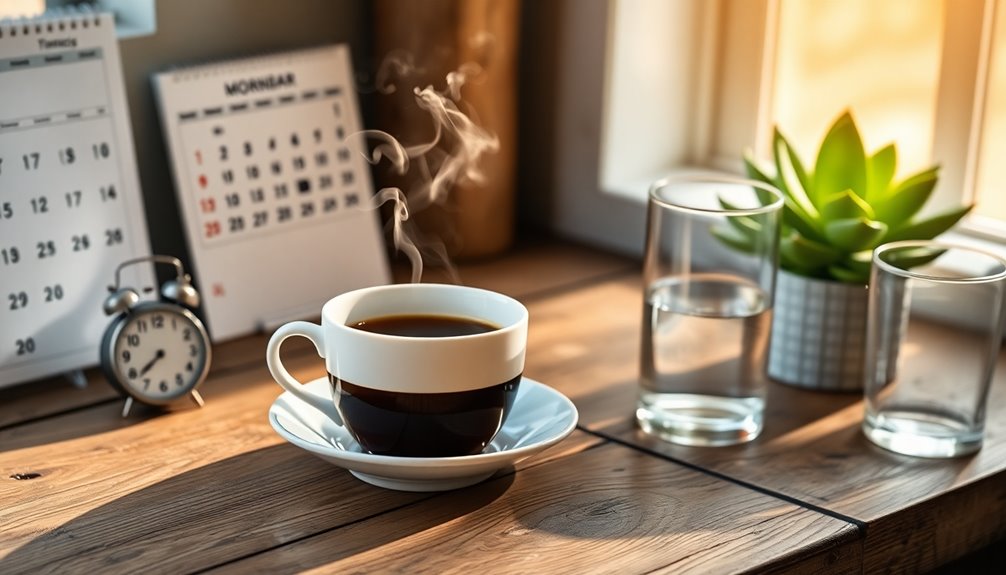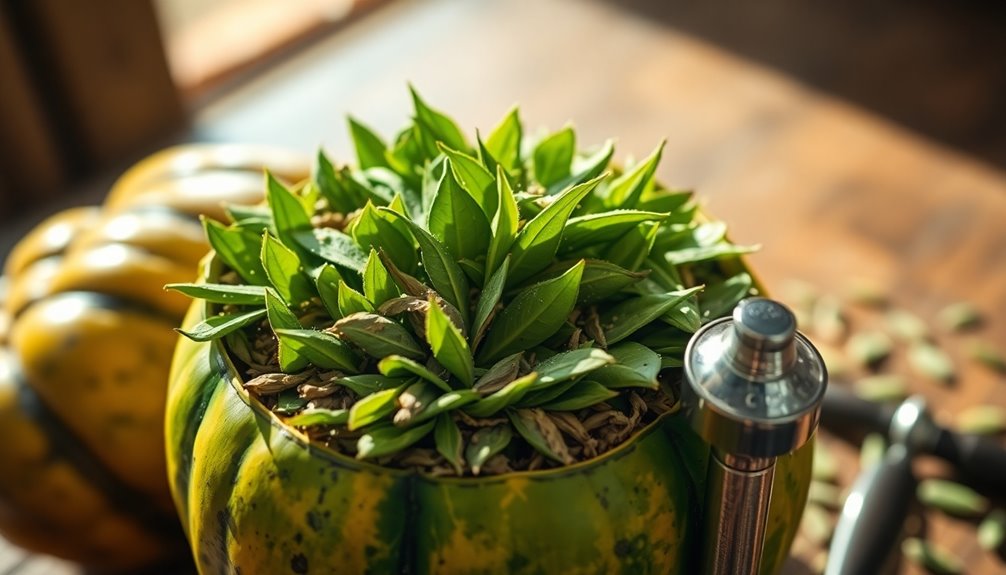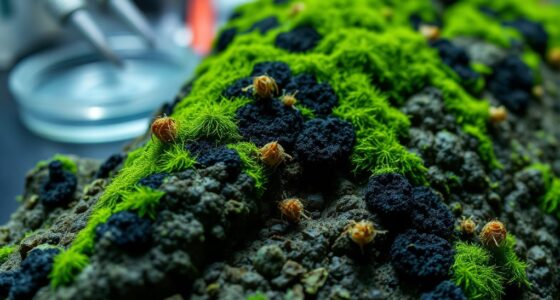Chai tea usually contains between 20 to 100mg of caffeine per cup, but it mainly depends on the type of tea and how you prepare it. Traditional masala chai, made with black tea, typically falls between 40 to 70mg for an 8 oz serving, making it a moderate choice for caffeine lovers. If you use a powdered chai mix or cold brew, you’ll notice lower caffeine levels, around 25 to 55mg. The specific caffeine amount can vary based on steeping time and tea size. Want to know about different chai varieties and their benefits? There’s plenty more to explore! Understanding the chai tea caffeine content can help you make informed choices based on your caffeine sensitivity or dietary preferences. Additionally, while traditional masala chai provides a comforting blend of spices and tea, exploring caffeine-free alternatives like herbal chai can offer similar flavors without the caffeine kick. Whether you’re waking up with a cup or winding down, there’s a chai option that suits every occasion!
Key Takeaways
- Caffeine content in chai varies by type, typically ranging from 20 to 100mg per 8 oz serving.
- Traditional Masala Chai made with black tea usually averages around 40-70mg of caffeine.
- Steeping time significantly affects caffeine levels; longer steeping increases caffeine extraction.
- Chai lattes from powdered mixes generally contain 25 to 55mg of caffeine.
- Herbal chai blends are usually caffeine-free, while Prana Chai's caffeine levels vary based on preparation.
Understanding Chai
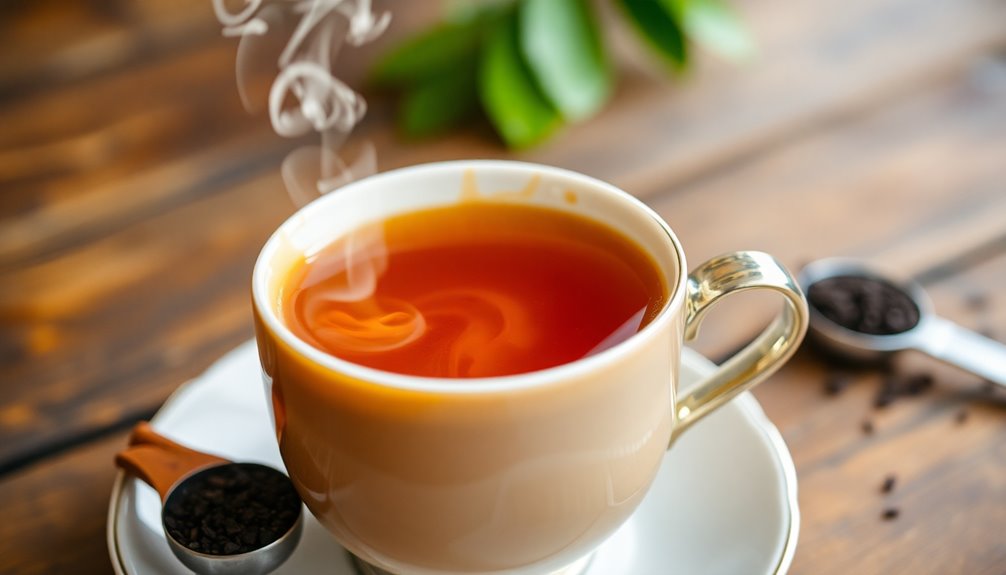
When you plunge into the world of chai, you'll discover it's much more than just a spiced tea. Chai, which means "tea" in Hindi, has deep roots in traditional Indian culture.
It's not just about the flavor; it's also about how chai tea is prepared. You can enjoy various forms, from classic black tea to caffeine-free options like Rooibos. The caffeine content varies too, depending on the steeping time and the tea-to-spice ratio you choose.
For instance, Prana Chai can range from 20 to 100mg per cup. Tannins in chai slow caffeine absorption, giving you a calm and focused experience instead of the jitters often linked to coffee. Additionally, many chai recipes incorporate natural antioxidants that can help support overall health.
Embrace the soothing ritual of chai!
Caffeine Content in Chai
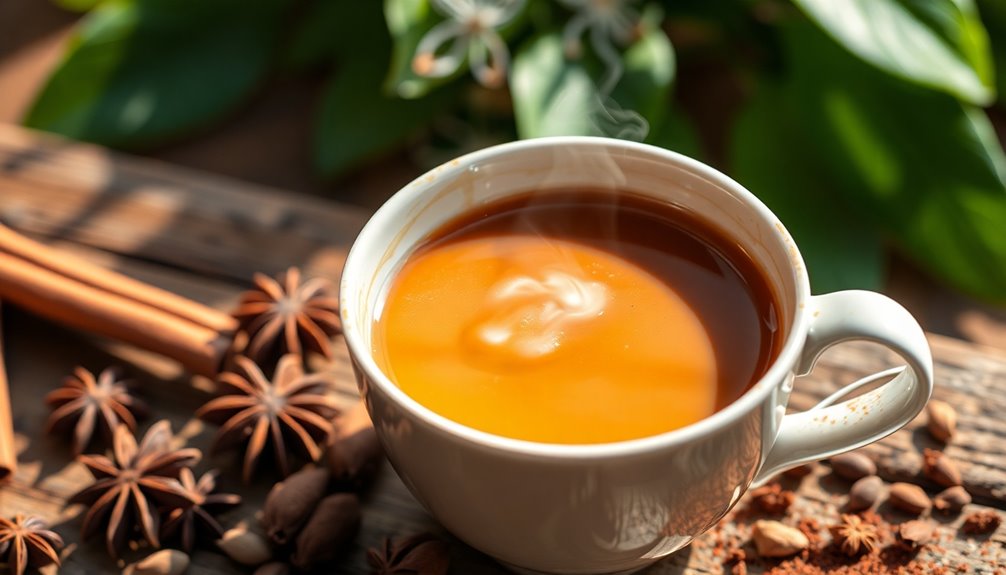
Chai isn't just a flavorful experience; it's also important to understand its caffeine content. A typical cup of chai contains about 40mg of caffeine, which is considerably less than the average coffee cup with around 120mg.
However, caffeine in chai can vary based on preparation methods. For instance, Prana Chai may provide between 20 to 100mg per cup depending on steeping time. If you steep your chai for a shorter duration, you could reduce caffeine levels by up to 80%.
Additionally, chai lattes made from powder mixes usually hold between 25 to 55mg of caffeine. The tannins present in chai slow caffeine absorption, promoting a calm focus instead of the jitters you might experience with coffee.
Effects of Chai Caffeine
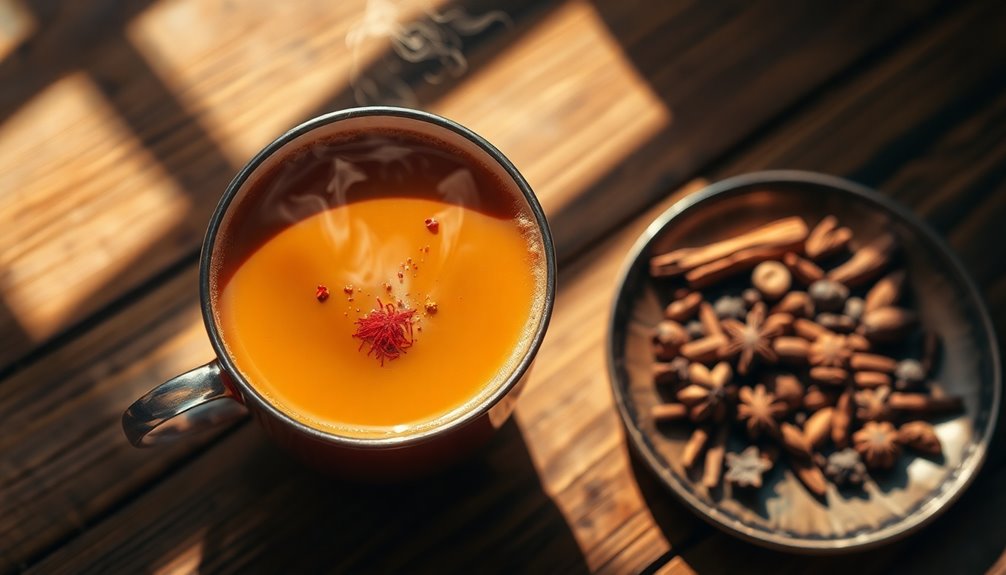
Although many people enjoy chai for its rich flavor, the caffeine it contains can also greatly impact your experience.
With about 40mg of caffeine in chai, it's lower than coffee, which means you're less likely to feel jittery. The effects of chai caffeine are more gradual, thanks to its interaction with tannins, allowing for a calm energy boost instead of a sudden spike.
This makes chai a fantastic choice if you want to stay focused without disrupting your sleep patterns. Plus, the moderate caffeine levels mean you can enjoy it in the evening.
Preparation Methods for Chai
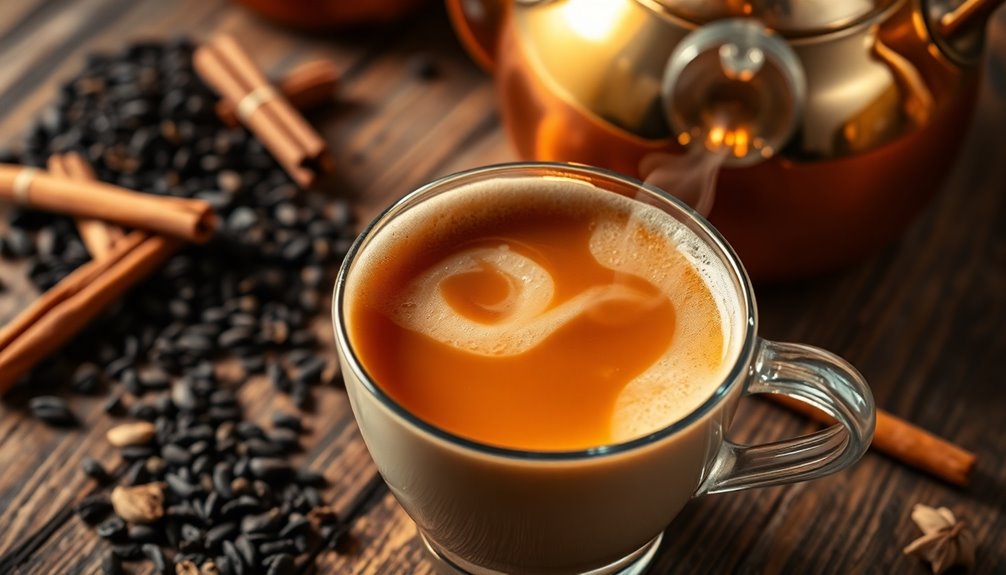
For those looking to enjoy chai while managing their caffeine levels, preparation methods play an essential role.
Traditional chai is made with black tea, warm milk, sweeteners, and spices, which can all affect the caffeine in tea. If you steep your chai for 5-8 minutes, you'll extract most of the caffeine, but reducing the steeping time can lower caffeine levels by up to 80%.
If you're more into convenience, chai lattes made from powdered mixes contain between 25 to 55 mg of caffeine.
For a caffeine-free experience, consider specific decaffeinated chai options, allowing you to savor the flavors without the stimulant effects. Additionally, adding ingredients like chia seeds can enhance the nutritional profile of your chai, providing benefits such as improved digestive health.
With these preparation methods for chai, you can tailor your experience to fit your caffeine preferences.
Chai Variations and Caffeine Levels
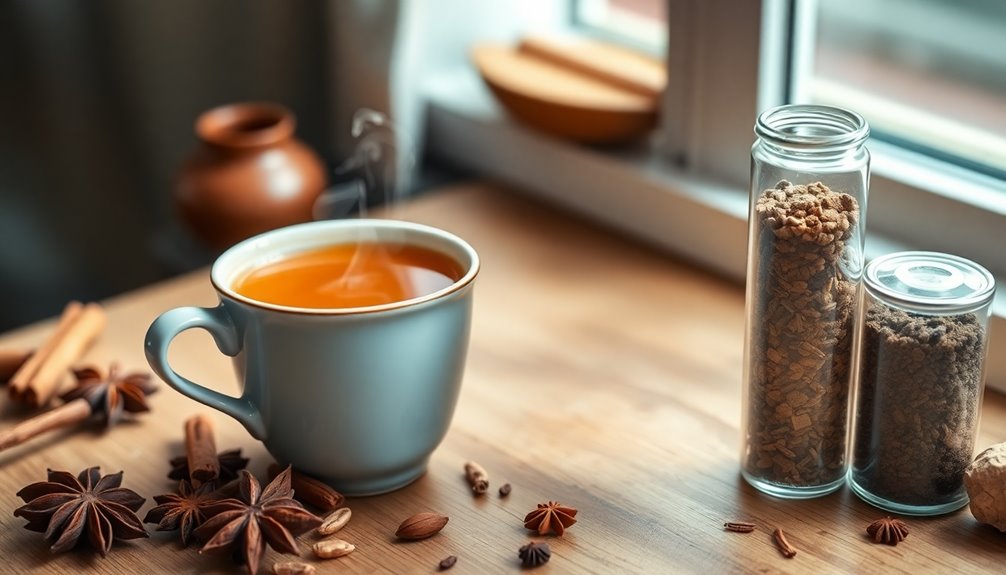
When exploring the world of chai variations, you'll find that caffeine levels can vary considerably based on the type of tea used and how it's prepared.
Traditional chai typically contains between 20 to 100mg of caffeine per cup, depending on steeping time. For example, a longer steep can yield more caffeine, with 10 minutes releasing around 21mg, compared to just 13mg at 4.5 minutes.
If you're enjoying a chai latte made from powdered mixes, expect about 25 to 55mg per serving.
For a caffeine-free alternative, consider Rooibos chai, which is perfect for those sensitive to caffeine.
Chai concentrates usually have higher caffeine levels, ranging from 30 to 35mg per serving, making them a robust option.
Health Benefits of Chai
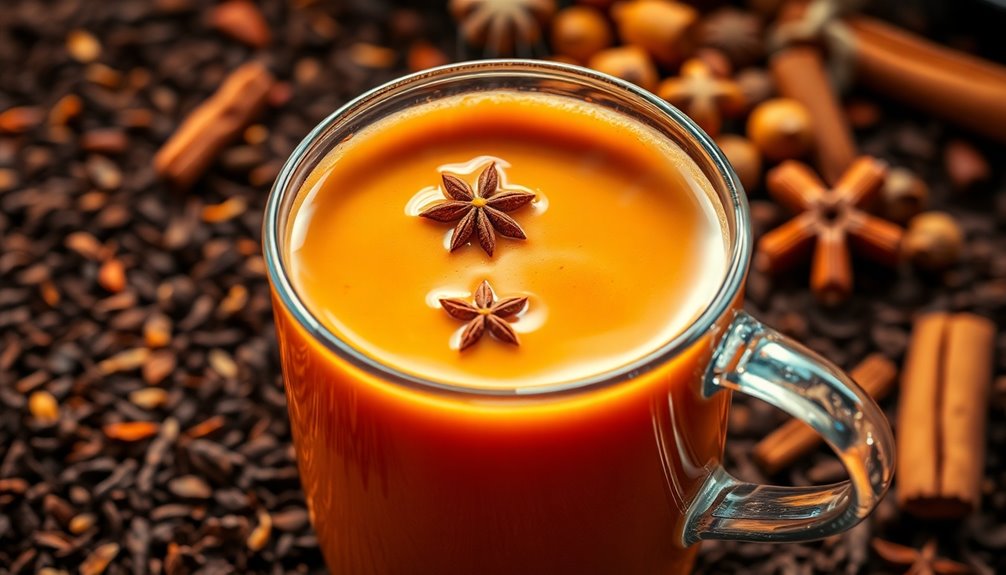
When you sip on chai, you're not just enjoying a warm beverage; you're also boosting your brainpower thanks to tea polyphenols and Theanine. Plus, the blend of spices can support your heart health by improving circulation and lowering cholesterol. It's a delicious way to enhance your well-being while savoring a comforting ritual. Additionally, incorporating spices commonly found in chai, such as ginger and cinnamon, may promote anti-inflammatory properties that contribute to overall health.
Cognitive Enhancement Benefits
Chai tea offers more than just a warm, comforting beverage; it can also enhance your cognitive function. The caffeine in chai, combined with tea polyphenols like Theanine, promotes improved attention and mental clarity.
Unlike coffee, which can leave you jittery, chai provides a calm focus that helps you tackle your tasks effectively. Regularly sipping chai may support your cognitive health, potentially lowering the risk of neurodegenerative diseases thanks to its antioxidant properties.
Additionally, the spices in chai, such as ginger and cardamom, contribute to brain health and cognitive benefits. This unique blend not only elevates your mood but also fosters a mindful approach, making chai a smart choice for daily mental wellness. Moreover, proper nutrition for cognitive development is essential, as it lays the foundation for better focus and overall brain function.
Cardiovascular Health Support
While enjoying a warm cup of chai, you might be pleasantly surprised to learn that it supports cardiovascular health. Here are some key benefits:
- Tea Polyphenols: These compounds improve blood flow and reduce inflammation.
- Heart-Protective Spices: Ingredients like ginger and cinnamon can help lower cholesterol levels.
- Reduced Heart Disease Risk: Regular chai consumption is linked to better heart function and a lower risk of heart disease.
- Calming Caffeine Effects: The caffeine in chai interacts with tannins, which may help lower blood pressure.
Additionally, the antioxidants in chai combat oxidative stress, a factor in cardiovascular diseases.
Comparing Chai and Coffee
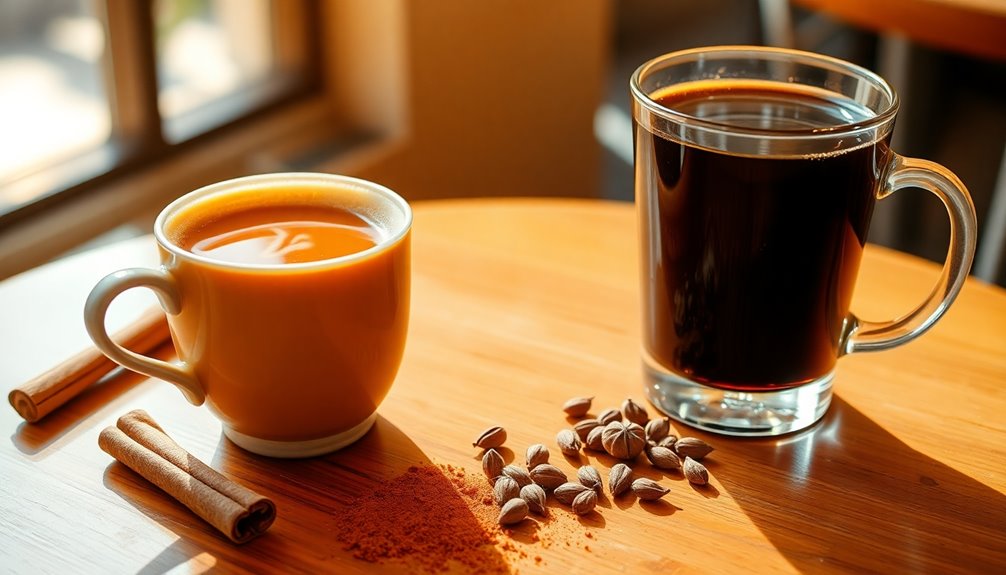
How does chai measure up against coffee when it comes to caffeine? A typical serving of chai contains about 40mg of caffeine, considerably less than the average coffee cup, which packs around 120mg.
This lower caffeine content means you can enjoy chai in the evening without worrying about sleep disruption. Plus, the caffeine in chai interacts with tannins, leading to a slower absorption rate. This promotes a calm focus, unlike the jittery high many experience with coffee.
Depending on the preparation method, chai's caffeine levels can vary from 20 to 100mg per cup. Ultimately, chai offers a different experience, focusing on clarity and sustained energy rather than a quick caffeine kick like coffee does.
Shopping for Chai Tea
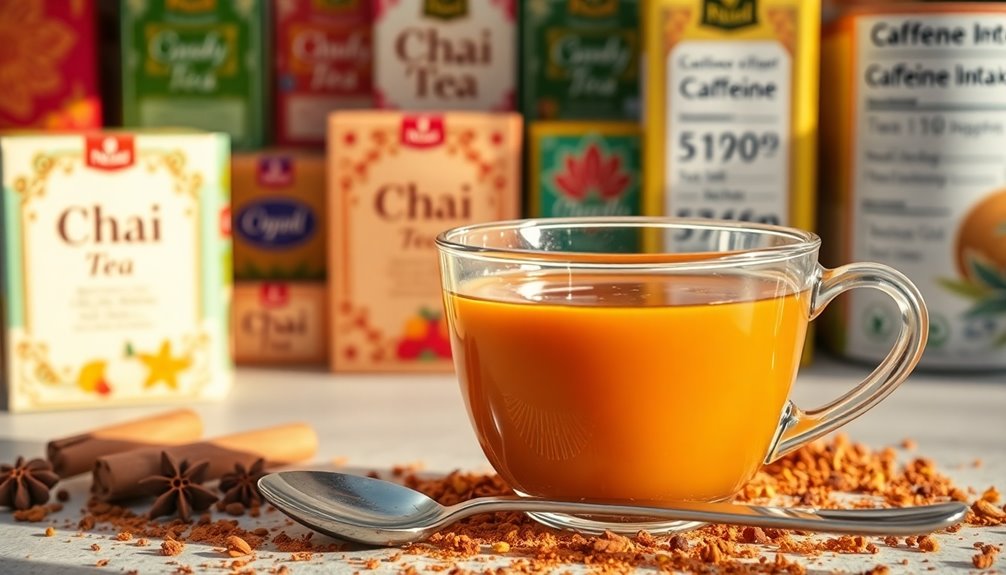
If you're a chai lover, exploring different options can be an exciting journey.
With so many choices out there, you can find the perfect chai tea that suits your taste and budget. Here are some options to evaluate:
- Masala Chai – Starts at just $3.00, making it an affordable option for enthusiasts.
- Saratoga Red Chai – A caffeine-free choice priced from $4.00, perfect for those avoiding caffeine.
- Spiced Orange Chai – Unique flavors for around $3.20, offering a distinct taste experience.
- Golden Dragon Chai – Known for its distinctive flavor profile, available for $3.80.
Whether you're after unique flavors or a budget-friendly pick, there's a chai tea for everyone.
Happy shopping!
Frequently Asked Questions
How Much Caffeine Is in Chai Tea Vs Coffee?
When you compare the caffeine in chai tea to coffee, you'll notice a significant difference.
A typical chai contains around 40mg of caffeine, while a standard cup of coffee packs about 120mg. This means chai offers a gentler boost, often promoting a calm focus instead of the jitters coffee can cause.
Factors like steeping time and preparation methods also influence the caffeine levels, so your chai's caffeine content might vary.
How Much Caffeine Is in a Starbucks Chai Tea?
Did you know that a grande Starbucks Chai Tea Latte packs around 95mg of caffeine?
When you sip on this drink, you're enjoying a flavorful blend of spices and black tea.
This caffeine amount is a bit lower than a standard cup of coffee, which typically has about 120mg.
If you're sensitive to caffeine, Starbucks also offers a decaffeinated chai option, providing a tasty alternative without the buzz.
How Much Caffeine Is in a 12 Oz Dirty Chai?
When you sip on a 12 oz dirty chai, you're likely getting between 50 to 90 mg of caffeine.
The exact amount depends on the black tea and espresso used. If it's made with a standard chai concentrate, you might find around 30 to 50 mg from the chai and an extra 70 mg from the espresso shot.
Brewing with loose leaf tea can increase that level, making it a solid choice for an energy boost.
Will Chai Tea Keep You Awake?
Chai tea can keep you awake, but it depends on your sensitivity to caffeine.
With about 40mg of caffeine per serving, it's lower than coffee, so you're less likely to feel jittery. The tannins in chai slow caffeine absorption, promoting a calm focus instead of a restless buzz.
If you're sensitive to caffeine or looking to avoid it, opt for caffeine-free options like Rooibos chai, which still offers delicious flavors without affecting your sleep.
Conclusion
To sum it up, chai tea offers a delightful blend of flavors and a moderate caffeine boost that can enhance your day. With about 40-70 mg of caffeine per cup, it's a perfect alternative to coffee for those who crave a gentle pick-me-up. So, why not savor a warm cup of chai, embracing its rich history and health benefits? You deserve a moment of comfort and joy in your busy life, and chai is here to provide just that.


